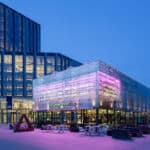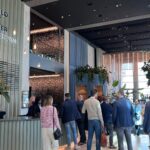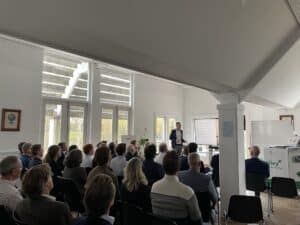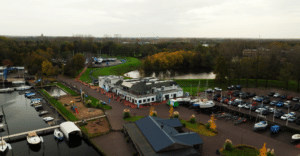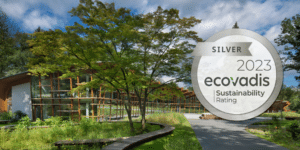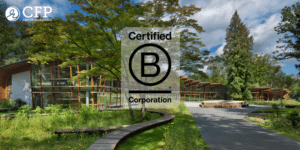
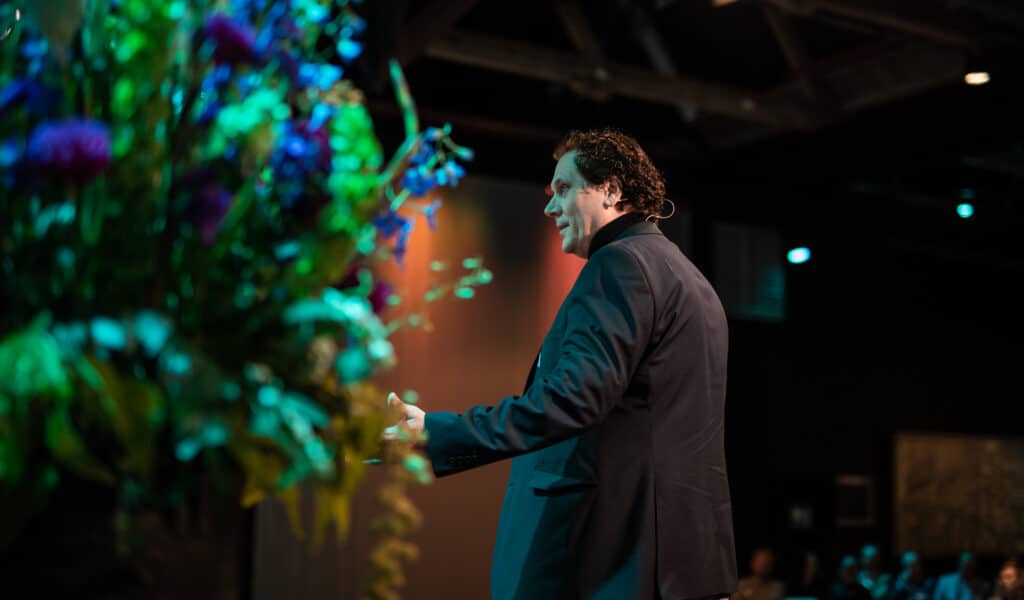
Look back on the Innovation Dragons’ Den: “The only thing that can break a trend is innovation”
After the successful first online edition of the Innovation Dragons Den organised by CFP Green Buildings, a sequel was bound to happen. On 30 June, nine pitchers who want to improve the world and make it more sustainable with their innovations were once again on the digital stage. Read more about the pitches in this article.
Increasing sustainability is going too slowly: break in the trend is not yet in sight
The Innovation Dragons’ Den was kicked off by Pleun Tasche of Unifore Real Estate and Bram Adema of CFP. Both were looking forward to an afternoon full of innovations: “Today we are guests of Unifore Real Estate, in the World Port Center,” says Adema. “It doesn’t matter which newspaper you read: they all say we are not increasing our sustainability fast enough, and the break in this trend is not yet in sight. So today we’re going to start changing that. Your challenge is to give your pitch under time pressure, and then survive our questions.” Tasche adds: “In addition, the power of today’s event will be getting you in touch with clients, by getting to know them directly in one of the digital booths.”
The first to speak was Haas Heat, which focuses on making hybrid heat pumps more accessible. At present, most people in the Netherlands know that a heat pump is a sustainable choice, but generally think of it as an “expensive” choice. Raymond Silderhuis dispelled this prejudice: “It doesn’t have to be. You can have one on a plan like your company bicycle or personal PC plan, paid for from your gross salary or even with vacation days. And the payback period is short: from 3 to 5 years.” Using the hybrid heat pump can move you up at least two energy labels, and maybe more. “We arrnage for an ISDE subsidy and handle the tax treatment. The employer doesn’t have to worry about it – that’s perhaps the best part.” The size of the organisation doesn’t matter, either: “Any employer can participate. The hybrid heat pump has to fit in your home, so what you do need is a video inspection.” Adema thinks that under the scheme, which is intended to accelerate the energy transition, heat pumps will be “going like hotcakes”.
The attendees of the Dragons’ Den chose Haas Heat and Ecoplant as the winning pitches of the day. Otree finished in third place.
Mobile energy factory
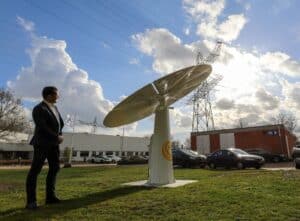
The participants of the Innovation Dragons’ Den stayed on this topic with the pitch by Hans Veenemans from Ecoplant, a rotating solar factory. “In the morning it faces east and in the evening it turns to the west. What is special is that it can stand completely on its own; Ecoplant needs no infrastructure in the ground and can be placed anywhere.” The “plant” in “Ecoplant” means factory, in that it is a power plant all on its own. “The strength is that you are not limited in the placement of the plant, for example in the park or on a festival site. It makes the best use of the available power from the sun, and it’s built to last. A large Ecoplant produces 4,000 kWh of energy.”
Marcel Niessing of Flexim took a different tack: “We measure the flow,” he begins. “In order to aspire to a sustainable future, you have to know what the zero point is. Then you also know how to take the next step.” His organisation focuses on “clamp-on flow measurement”, measuring systems that can make virtually all liquids and gases a resource. “When we distribute energy, we are faced with a loss of capacity. The challenge is to understand these energy flows and to visualise the losses. You can then improve on that. With our measuring systems, portable or fixed, you map out these flows and see where the savings are. Without complicated connections, you can connect the meters to gas and heating systems, for example.”
CO2: first reduce, then compensate

It was Rik Roskam from Trees For All who made the connection with another major challenge: reducing CO2 emissions. In 2030, we need to reduce our emissions of harmful greenhouse gases by 55% compared to 1990. The Netherlands Environmental Assessment Agency (PBL) has already indicated that we are lagging behind in this respect. Time for a catch-up sprint, Roskam says, and for this showed what the value of trees can be: “Trees are a necessary goal, indispensable. They are our allies in the fight against climate change. Our vision is: first reduce, then compensate. We inspire our business partners to reduce emissions and offset the ‘leftovers’ with certified projects.”
After a short break, the participants returned to be inspired again on how to reduce CO2 emissions more quickly than we are. This time the focus was on the design software from Hyssop, which is intended to help building managers get the most out of building systems. Does this mean that in this field, there are a lot of opportunities being missed? “Unfortunately, the answer is ‘Yes’,” Roel Vandenbulcke says, kicking off the second round of pitches. “Many HVAC installations do not perform as they should. The systems are often twice as big as they need to be and are designed for full load conditions, but at partial load they aren’t working properly.” According to him, the Hysopt software is the solution. “It allows us to identify the optimum design to make installations function optimally.” The result seems clear: “We are now involved in 250 projects, where we are achieving an average of 30% energy savings and 40% less CO2 emissions.”
“Calculated sustainability is outdated”
Next, Bram Schats of Avelution brought the intelligent working environment to the fore. “In today’s buildings, sustainability is calculated from the front end. It is mainly about energy and assumptions made about things like occupancy. Calculated sustainability is an outdated concept: it needs to be about the actual performance.” According to him, this starts with monitoring: “No more delivering and then just following up on complaints, but looking at the performance of the building and improving it.” He sees that energy and circularity are coming closer together, but that at the same time there is a proliferation of technologies and system languages. “A smart building is a prerequisite for bringing everything together. A smart building is not a gadget, it’s a system that provides insight into socially relevant themes such as health, safety and the circular economy. And improves on them.”
Aldwin Dame from Saint-Gobain walked the participants through the possibilities of renewable energy generation in the façade. Can the façade be a source of energy? According to Dame, it can: “Our energy ambitions are high and when you look at BENG or additional requirements, you can’t avoid exploring possibilities in the façade.” The challenges around a small roof area in high-rise buildings, for example, are well known. “There you have less space to generate renewable energy. The Energy Façade can play a role by using the surface of the façade to generate energy.” At the same time, it must not adversely affect the aesthetic value. “We often get questions about this and we make sure that the energy façade looks attractive. It has a frameless design with a glass exterior that is easy to clean.”
No more Sick Building Syndrome
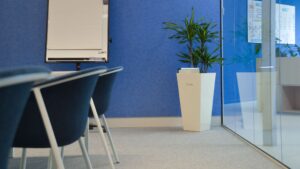
It was then Thomas Baks and Nick van Buijtenen’s turn, with what was meant to be the last of the second round of pitches: Otree. This innovative plant was developed to respond to a major challenge: solving Sick Building Syndrome. “Because we are insulating buildings better and better and making them more energy efficient, they are sealed up tight,” Van Buijtenen begins. “This means that the air contains a lot of CO2 when ventilation is poor and that more and more particulate matter gets into our buildings. We want to change that with the Otree.” The innovation works with a pre-filter and an ISO 16890 particulate filter. “The air is actively blown through the potting soil, and evaporation occurs as a result,” Thomas continues. “That’s good for increasing the moisture in the air, so you don’t have to suffer from dry eyes. The first thing that stands out about this potted plant is that it has a cable and power plug coming out of it. But it’s plug-and-play: plug it in and it starts working, with very low energy consumption — just 10 cents a day.”
Finally, Pien ter Beek of CFP Green Buildings closed things off with a “surprise pitch” about the importance and possibilities of the circular economy. “We believe that the circular economy is an important way of making buildings sustainable. Boas Kraaijeveld of CFP Green Buildings told us during the previous Innovation Dragons’ Den about the Planetary Boundaries: we are running up against the limits of our planet and are already exceeding them in many areas.” What opportunities do we still have to take the right steps? “The circular economy is an important means of staying within these limits. We still have work to do here. At the moment, we still see that we are still making and using products, many of which are not reused at all or only in a low-grade way, whereas upcycling is what we want.” CFP Green Buildings therefore wants to inspire people to take circular steps. “To measure is to know, so we show with the CFP Circular Gap meeting how circular your building is. On that basis, you can then set goals and draft a roadmap to be prepared for the future.”
Written by Marvin van Kempen, Duurzaam Gebouwd


